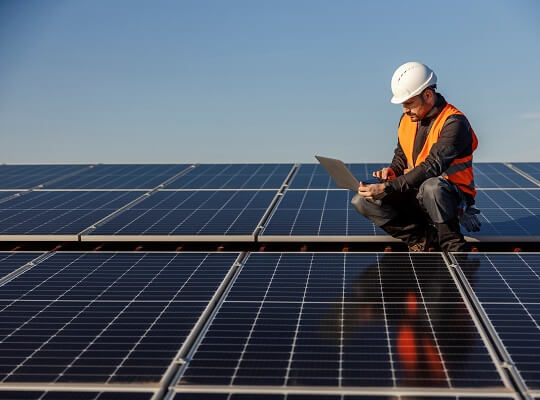Explore Commercial Solar Power Benefits: Why More Businesses are Making the Switch in Fort Lauderdale
Explore Commercial Solar Power Benefits: Why More Businesses are Making the Switch in Fort Lauderdale
Blog Article
Every Little Thing You Required to Know Regarding Solar Energy Setup and Its Benefits
Solar power installation stands for a considerable development in power solutions, incorporating innovation with sustainability. Understanding the nuances of this installation, consisting of linked expenses and upkeep, is critical for property owners considering this financial investment.
Understanding Solar Energy Basics
Solar power, taken advantage of with photovoltaic or pv cells, represents a pivotal improvement in renewable energy technology. This procedure not just decreases greenhouse gas emissions yet also lowers dependence on non-renewable power resources.
In enhancement to photovoltaic or pv cells, solar power systems can include solar thermal innovations, which catch sunlight to generate warmth for household and commercial applications. The versatility of solar energy enables numerous setups, from small property configurations to massive solar ranches.
The effectiveness of photovoltaic panels is influenced by elements such as the angle of installment, geographic location, and weather. While solar modern technology has progressed dramatically, continuous research study remains to boost effectiveness and reduce costs.
Comprehending these essentials prepares people and services to review solar power's feasibility for their energy needs. As the world increasingly focuses on lasting power solutions, solar power sticks out as a leading option, adding to a cleaner and even more lasting future.

The Solar Setup Process
The trip from understanding solar energy to its useful application entails a systematic installation procedure that makes sure optimal performance and performance. At first, a detailed site analysis is carried out to assess factors such as roof covering positioning, shading, and structural integrity. This assessment aids to establish the system size and type that ideal suits the certain energy requirements of the residential property.
Following, a detailed design stage follows, where solar engineers develop a customized design, integrating the suitable photovoltaic panels, inverters, and placing systems. When the layout is settled, the installation stage starts, usually involving the mounting of photovoltaic panels on the roof or ground, link of electrical elements, and assimilation with the home's existing electric system.
Instructional resources are offered to house owners, empowering them to make best use of the benefits of their brand-new solar system. This organized process not just helps with a smooth setup but additionally boosts the long-lasting performance of solar power systems.
Expenses Associated With Setup
When considering the installation of a solar power system, recognizing the connected costs is important for house owners and services alike. The overall expenditure of solar installation can differ considerably based on numerous variables, including system dimension, kind of solar panels, and installment complexity.
Typically, the main expenses include the photovoltaic panels, inverter, installing hardware, and labor. Usually, property solar installations can vary from $15,000 to $30,000 before any kind of federal or state rewards. Furthermore, setup prices may consist of permitting fees, inspection fees, and the cost of connecting the system to the grid.
It is also necessary to consider continuous maintenance and prospective fixing expenses, although solar systems normally require minimal upkeep. Funding alternatives, such as solar financings or leases, can assist manage in advance prices and improve availability.
Last but not least, regional market conditions and neighborhood laws might affect rates, making it critical to get multiple quotes from respectable installers to ensure competitive prices. best solar energy company in fort lauderdale. By extensively reviewing the expenses included, individuals can make educated choices that line up with their economic capacities and power requirements
In enhancement to cleaning, it's vital to keep track of the system's efficiency via data evaluation. Many modern-day solar systems come outfitted with surveillance software application that can inform house owners to any kind of decrease in efficiency or functional concerns.
For thorough assistance, think about partnering with reputable solar installation business that supply maintenance contracts. These contracts usually consist of regular inspections, repair work, and client assistance, making sure that any concerns are attended to immediately. By buying maintenance and assistance choices, homeowners can delight in the complete advantages of solar energy while decreasing prospective interruptions to their power supply.
Conclusion
In final thought, solar power installment presents a feasible service for minimizing power prices, enhancing building worths, and promoting environmental sustainability. Embracing solar innovation ultimately sustains a shift towards cleaner power sources, fostering a much more lasting future for homeowners and the broader community.
Report this page